How to remove a Google Chrome extension "Installed by enterprise policy"?
Google Chrome extension "Installed by enterprise policy" - how to remove?
This removal guide shows how to remove a Google Chrome extension that was "Installed by enterprise policy". Note that recently, there is a rise in adware infections, and in many cases, these potentially unwanted programs (PUPs) install on users' Internet browsers disguised as legitimate extensions. Commonly, potentially unwanted applications are bundled with free software downloaded from the Internet, the installation of which, is often a consequence of not paying close attention to the installation steps.
To avoid inadvertent adware or PUP installation, Internet users should always install freeware choosing the 'Custom Installation' option rather than 'Typical Installation' - and be sure to opt-out of any changes to your Internet browser settings. Also, disallow installation of any additional software. In this removal guide I will demonstrate how to remove the "Coupon Server" Google Chrome extension that is marked as "Installed by enterprise policy". I chose this extension simply as an example, however, this removal guide is generic and will help you to remove any Chrome extension that is marked as installed by enterprise policy.
Download Computer Malware Repair Tool
It is recommended to run a free scan with Combo Cleaner - a tool to detect viruses and malware on your device. You will need to purchase the full version to remove infections. Free trial available. Combo Cleaner is owned and operated by Rcs Lt, the parent company of PCRisk.com read more.
To check the Google Chrome extensions: Click on the bars icon (top right corner of Google Chrome), select 'Tools' and click 'Extensions'.
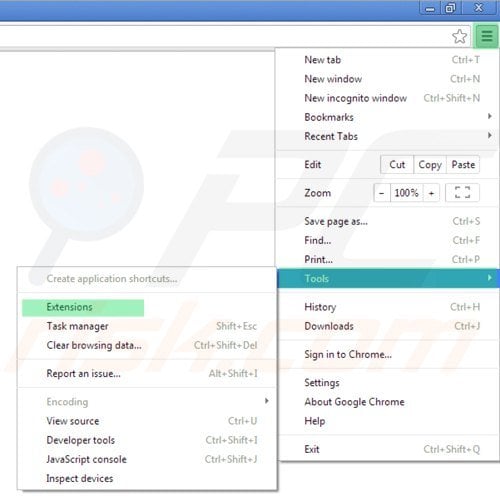
Here is an example of a Chrome extension that is marked as "Installed by enterprise policy" (it is greyed-out, and therefore, users are unable to disable or remove it):
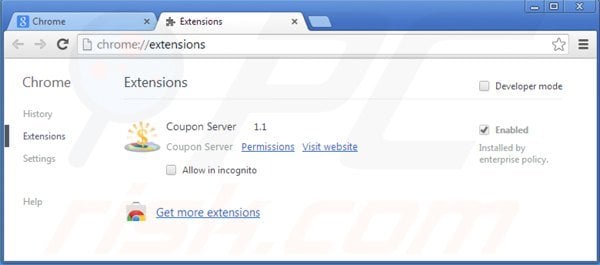
When dealing with "Installed by enterprise policy" Google Chrome extensions, first check for any recently-installed software within your operating system's 'Add/remove programs'. In some cases, uninstalling this software will also eliminate the associated Internet browser extension.
Windows 10 and Windows 8 users:
Right-click in the lower left corner of the screen, in the Quick Access Menu select "Control Panel". In the opened window choose "Uninstall a Program." Look for recently added software, select the entry and click Uninstall.
Windows 7 users:
Click "Start" ("Windows Logo" in the bottom left corner of your desktop), choose "Control Panel". Locate "Programs and Features". Look for recently added software, select the entry and click Uninstall.
Windows XP users:
Click "Start", choose "Settings" and click "Control Panel". Locate and click "Add or Remove Programs". Locate "Programs and Features". Look for "recently added software, select this entry, and click Remove.
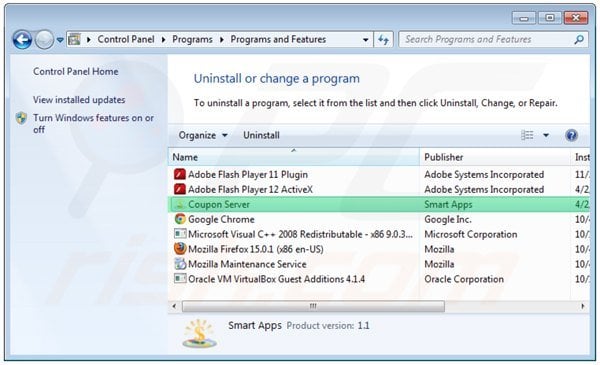
After uninstalling the unwanted software, check your Internet browser extensions. If you continue to observe unwanted entries in your Google Chrome extensions list, continue with the removal instructions.
Firstly, you need to make a note of the ID of the unwanted "Installed by enterprise policy" extension. You will need this in later removal steps to verify the ID of an extension. Click on the bars icon (top right of the Google Chrome), select "Tools" and click on "Extensions", select "Developer Mode".
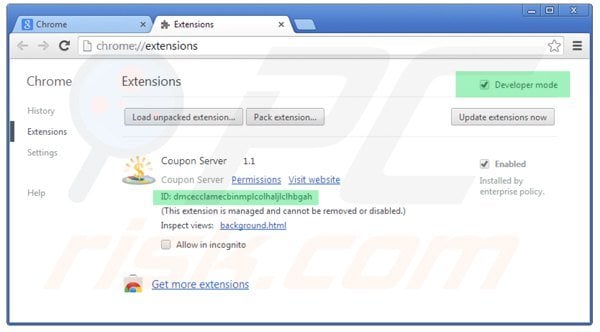
To remove the "Installed by enterprise policy" Chrome extension, you firstly need to close Google Chrome:
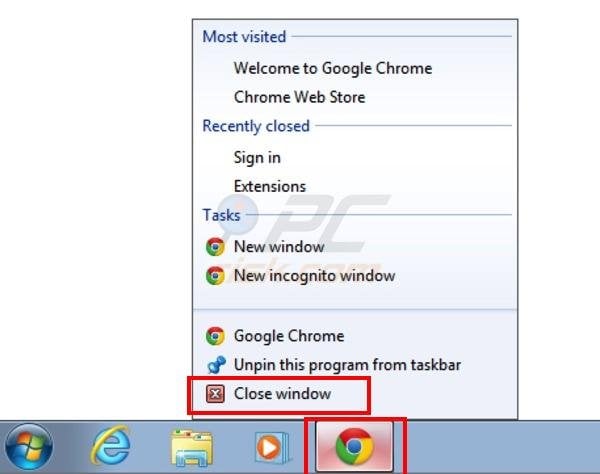
Right click on the Google Chrome icon and choose "Close window".
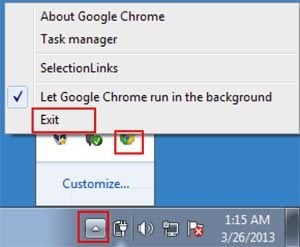
After closing Google Chrome, remove the registry entries of the "Installed by enterprise policy" extension:
In Windows XP - Click Start, Run.

In the opened window type "regedit".

In Windows 7 - Click Windows Logo (Start), in the "Search Programs and Files" field, type "regedit" and press Enter.
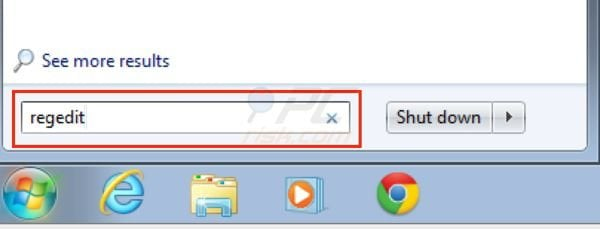
In Windows 10 - Click the Windows logo (Start) and type “regedit”, looks in the best match section and click on “regedit”.
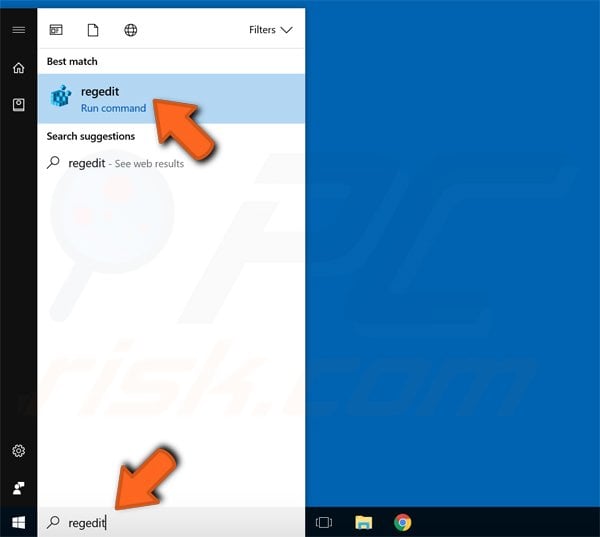
In the opened Registry Editor click "Edit" and select "Find...".
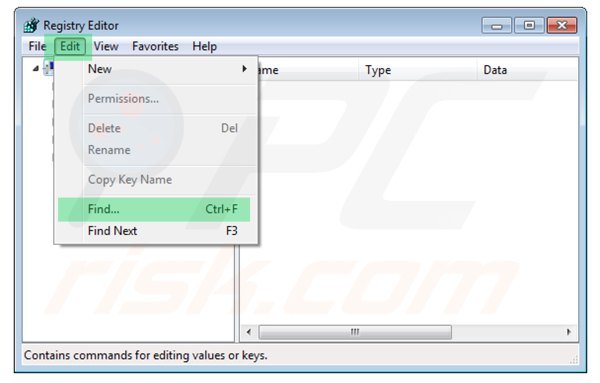
In the opened window paste the ID of the "Installed by enterprise policy" Chrome extension which you are trying to remove and click "Find next" button.
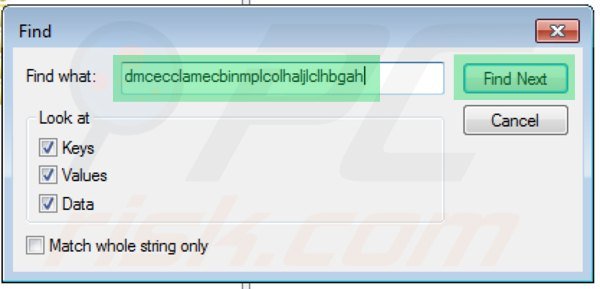
Remove the registry key matching the Data value of the "Installed by enterprise policy" extension's ID (right click on the registry key and select "Delete"):
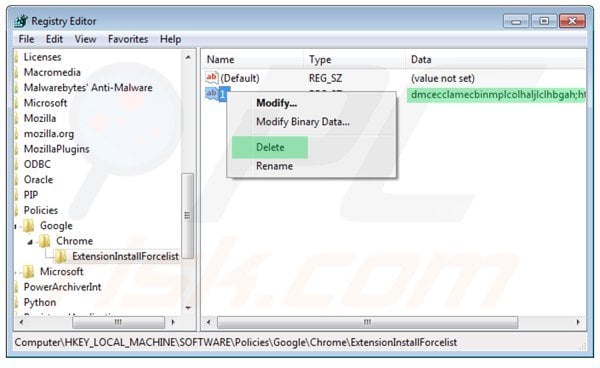
Confirm that you want to remove the registry entry by clicking "Yes" button.

After removing the registry entry of the "Installed by enterprise policy" Chrome extension, remove the associated files. To do this, Open "My Computer" and navigate to "C:\Users\YOUR USER NAME\AppData\Local\Google\Chrome\User Data\Default\Extensions". Remove the directory matching the ID of the "Installed by enterprise policy" Chrome Extension.
You can access your AppData directory by typing %USERPROFILE% (Windows XP) or %localappdata% (Windows 7 and Windows 8), in the Run dialog box.
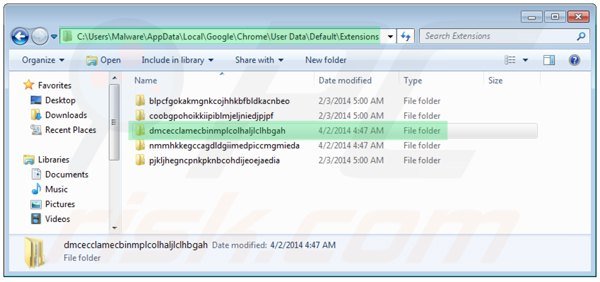
Navigate to C:\Windows\System32\GroupPolicy\Machine (or C:\Windows\System32\GroupPolicy\User) folder and remove the file named Registry.pol
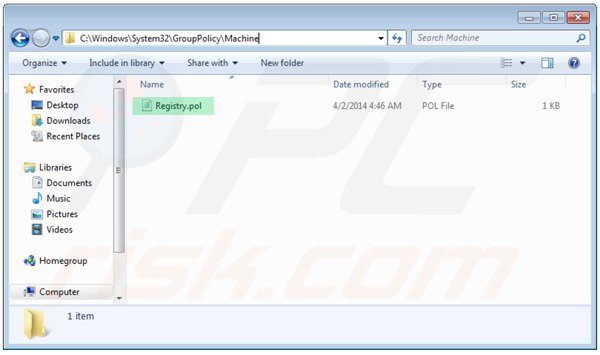
Finally open Google Chrome and check the extensions list. The "Installed by enterprise policy" extension should now be removed.
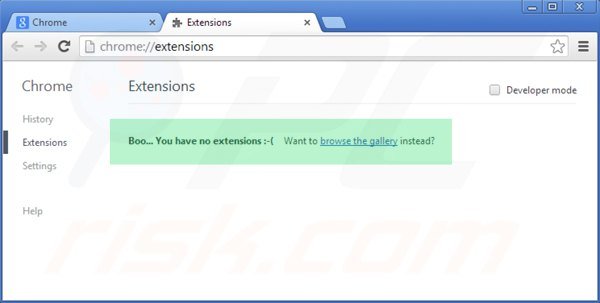
Share:

Tomas Meskauskas
Expert security researcher, professional malware analyst
I am passionate about computer security and technology. I have an experience of over 10 years working in various companies related to computer technical issue solving and Internet security. I have been working as an author and editor for pcrisk.com since 2010. Follow me on Twitter and LinkedIn to stay informed about the latest online security threats.

▼ Show Discussion